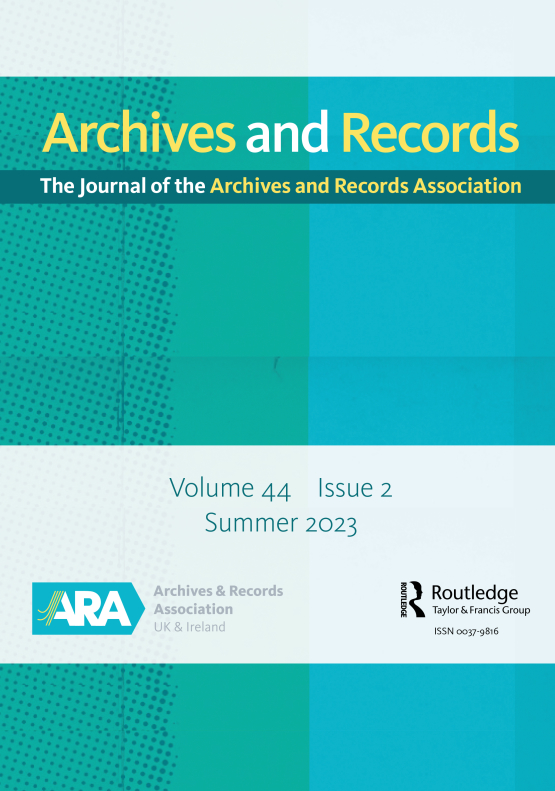Submit a Manuscript to the Journal
Archives and Records
For a Special Issue on
Sustainability and Climate Change: Archives’ Evolving Roles and Processes
Abstract deadline
28 June 2024
Manuscript deadline
29 November 2024

Special Issue Editor(s)
Hui Chen,
Associate Professor, Central China Normal University, Wuhan China
[email protected]
Pekka Henttonen,
Associate Professor, Tampere University, Tampere, Finland
[email protected]
Yi Qian,
Professor, Renmin University of China, Beijing, China
[email protected]
Sustainability and Climate Change: Archives’ Evolving Roles and Processes
Climate warming refers to the long-term increase in average global temperatures due to the accumulation of greenhouse gases in the Earth’s atmosphere. This phenomenon is primarily caused by human activities, such as the burning of fossil fuels, deforestation, and industrial processes. It may lead to potential devastating consequences, including rising sea levels, more frequent and intense extreme weather events, melting glaciers, and shifts in ecosystems.
Sustainability, on the other hand, involves adopting life habits, professional practices and policies that minimize greenhouse gas emissions, reduce reliance on non-renewable resources, promote renewable energy sources, protect ecosystems, and ensure social and economic well-being for all. It aims to create a balance between environmental, social, and economic factors to ensure a livable planet for future generations. Sustainable practices and policies are essential to mitigate the impacts of climate warming and transition to a more resilient and low-carbon society.
Archival practice, processes and policies should therefore evolve to be more sustainable and resilient. However, there is much more archivists and archival institutions can do, ranging from activism and preserving evidence of climate change to the dissemination of ethical behaviors and social education. As an example of this archival action, archive management provides a legal, ethical and practice-based framework for renewable energy construction projects as a completely new and vibrant renewable energy emerges. These projects involve complex planning, design, and implementation processes that are very different in nature, location, procedures and ethical considerations from traditional ones.
This special issue aims to address how archivists and archives as socially responsible institutions can respond to the challenges of sustainability and climate change. Therefore, articles in this special issue are expected to address the following themes among other potential themes:
- Digital Transformation, Accessibility and Archival Policies and Climate Change;
- Climate Change Evidence storage, analysis, dissemination and preservation;
- Archival Policies, Strategies and Processes to promote minimal impact on the environment and reduce carbon footprint;
- Collaborative, inter-sectional, interdisciplinary, and impactful climate change mitigation studies or action-oriented research;
- Studies on how archives can support and enable the change in organizational processes, policies, and standards that are necessary for societal, governmental, and global change to avert climate disaster;
- Archives leadership in sustainability dissemination and advocacy with the wider public through education, networking, social responsibility promotion;
- Creation, discussion, design of new governance, policies or standards on the multi-faceted role that archives play in handling climate change;
- Any other study, research, data analytics or inter-disciplinary research study or conceptual proposition that is not listed here and addresses archive management, practice, roles, ethos or ethics.
Looking to Publish your Research?
Find out how to publish your research open access with Taylor & Francis Group.
Choose open accessSubmission Instructions
Types of articles considered
- Completed Research studies;
- Case Study Analysis;
- Conceptual and/or Position Papers.
Articles should be no more than 8,000 words (including footnotes and references) and written in accordance with the style guide and reference guide (Chicago endnotes and bibliography) provided by Archives and Records. For an informal discussion about publishing in the special issue, contact [email protected]
How to submit a proposal
In the first instance, please send a 500 words (maximum) proposal to: [email protected], by 28 June 2024. Proposals should contain a brief outline of the proposed article, up to five key words, a title and author affiliations.
All submissions will be double-blind peer reviewed prior to acceptance for publication. An invitation to submit an article does not guarantee publication in the final issue. All submissions should be presented in line with the Archives and Records Instructions for Authors.
- Call for article proposals: 29 April 2024
- Deadline for article proposals: 28 June 2024
- Invitation to authors to submit full manuscripts: 31 August 2024
- Peer review and revisions: December 2024 to May 2025
- Final manuscripts ready for typesetting and proof-reading: 15 May 2025
- Publication online: 25 June 2025
- Publication in print: 1 July 2025